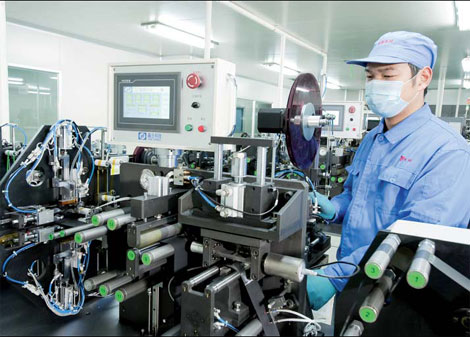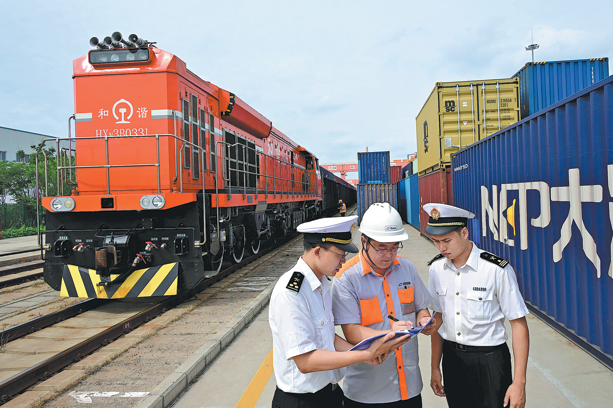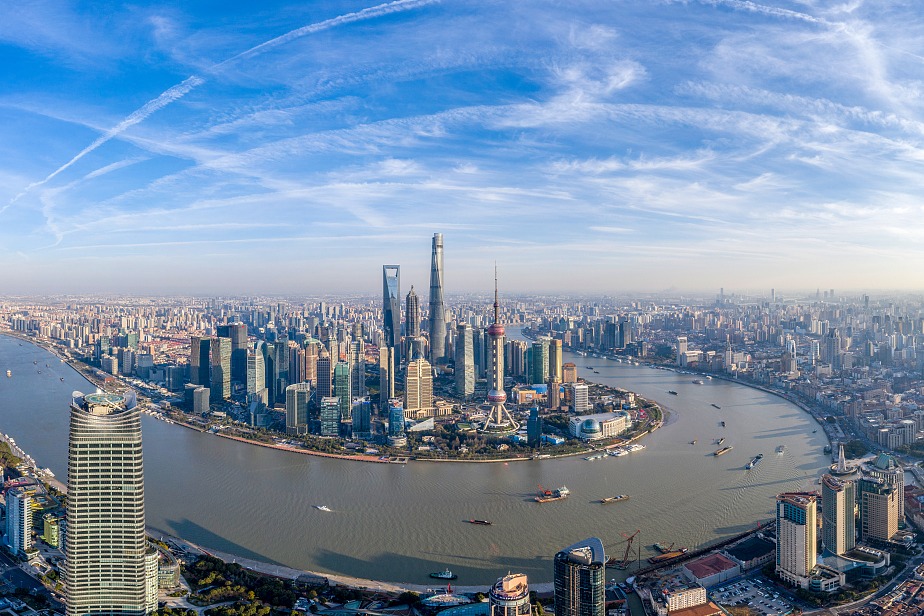Eye of the tiger

|
Tianneng's new production center, including the largest lead-acid battery recycling center in China, will start operations in June. [Provided to China Daily] |
Tianneng sets a green trail for lead acid battery makers in Changxing
Zhang Tianren is an ardent admirer of the beauty and strength of the tiger. But that does not mean that he lacks the aggressive and fierce traits that make the tiger a feared animal.
Over the years, Zhang has used his steely resolve and grit to transform Tianneng Group into the largest lead-acid battery producer in China, and set a tough development path that few may have the courage to tread.
So there is no surprise that the tiger takes up most of Zhang's business vision. The first thing that draws attention in the company's conference room is the large painting of a fierce tiger atop a mountain.
|
|
"The tiger is one of the strongest animals in the jungle, and I hope our business will also have similar traits in the real world," he says. Making such statements are often dismissed as tall claims. But Zhang exudes confidence that, like the crouching tiger, he can also be a worthy challenger and adversary.
Zhang's resolve to be the leader of the pack started in 1988 after he took control of a bankrupt battery workshop in Changxing, East China's Zhejiang province, for 70,000 yuan ($11,100, 8,400 euros). Most of that money came from the advances made by friends and well-wishers. Since then the company has gone to recoup its initial investments, get listed on the Hong Kong bourse and make profits consistently.
The company looks set for the next stage of development and as Zhang puts it, "the second 10 years of high-speed growth".
It is not that Zhang stands alone in his vision. In 2008, Forbes recognized Tianneng as one of the Top 10 Chinese companies with immense potential. US research firm Frost & Sullivan gave it the 2009 award for best new energy motive battery.
The company has also come up with impressive earnings numbers. Last year, the annual sales of the company stood at 15.2 billion yuan, while expectations for this year are about 20 billion yuan.
Despite the impressive growth, Zhang is still not too happy as he believes that future growth models need to be based on green tinges. Such concerns are natural, considering that lead-acid batteries are considered extremely harmful to the environment due to the high concentrations of lead and sulphuric acid. The answer to the pollution problem largely lies in effective recycling of batteries so that they do not pose any danger to the environment, he says.
In June, the company's new production center, which includes the nation's largest lead-acid battery recycling center, is expected to start operations.
The center can process 150,000 tons of used batteries to generate 100,000 tons of new lead. Sulphuric acid from the old batteries will be reused for chemical products, while 12,500 tons of plastics are expected to be recycled. All of this is expected to help the company achieve a near 100 percent recycling rate, Zhang says.
At the same time, the company is also promoting a battery-recycling program through its 25,000 sales outlets in China. People can exchange their old batteries for new ones and also get some subsidies for the new purchase, even as there is no restriction on brands.
"We want to make it a national movement. Once the whole recycling project is on track, we do not need to open new lead mines. That, in itself, is the biggest contribution to the environment," Zhang says.
It is difficult to imagine that the current green crusade is being championed by a company that nearly exited the business seven years ago after being charged with polluting the environment and endangering the health of residents.
In 2005, a group of local residents accused Tianneng Group of releasing polluted gas and water in the neighborhood and launched a demonstration against the company.
To make matters worse, a major blaze gutted most of the factory buildings. The blow could not have come at a worse time as the company had just become the largest producer of lead-acid batteries, mostly used in electric bicycles and mobile base stations, in China.
"The Tianneng incident had ripple effects on the entire industry. It eroded my confidence in the company, and there was a period of time when we were even planning to shift the manufacturing from Changxing," says Wang Qingzhong, director of the publicity department of Changxing county, who was the then deputy Changxing county magistrate in charge of industrial development.
"After detailed analysis of the situation, we realized that the government and the companies must work together to solve the problems," Wang says.
At that time, nearly 125 out of 175 battery-related companies were shut down or transferred to other industries. As the biggest company, Tianneng made more efforts than any other in this revolution.
Zhang stopped all production and started to develop technologies that reduce and prevent pollution during the manufacturing process.
"Moving to other places might be a good choice for maybe another five or 10 years. However, from a long-term perspective, the same problem will crop up again after a few years. So it is imperative that we change the existing production methods," Zhang says.
Wang from the county's publicity department says that the Tianneng saga is something like "the rise of the Phoenix from the ashes".
"Lead-acid battery is the pillar industry of Changxing, and Tianneng is the leader. Its success in coping with the incident inspired many others and led to a green resurgence," he says.
However, Zhang prefers to term the 2005 incident as an unprecedented opportunity for his company.
"If we were not affected by the scandals which restricted our development, we would not have had the motivation to move ahead on an environmentally friendly path," he says.
Tianneng currently has a team of more than 600 researchers, including experts from the Chinese Academy of Sciences and professors from Humboldt University in Berlin, Germany, focusing on energy efficient methods to produce batteries.
"We are confident of reducing 80 percent of the pollution produced during the process," Zhang says.
Having embarked on his mission to march forward on a green path, Zhang is now set for his next challenge of making his company a leading supplier of new energy batteries, especially in the electric car arena.
"We have shown what we could do during the Shanghai Expo by supplying the batteries for the electric cars at the Expo. The next step is to develop batteries for electric cars with longer durability," he says. The company has already set up eight experimental charging stations for electric cars in Jinhua, Zhejiang province.
Zeng Lingpeng, chairman of Chery New Energy Automobile Technology Co, one of China's leading electric car producers, believes Tianneng is capable of making breakthroughs in China's new energy vehicle industry.
"I believe Tianneng can popularize new energy automobiles in the Chinese market through their self-developed motive batteries," he says.
Zhang says Tianneng can stand on its own when matched up with international peers in fields like technology and facilities.
"The only shortfall is our managing capabilities, and once this problem is solved, we can clearly be the world leader," he says.
One would be wrong to think this is the pinnacle of Zhang's ambition. As a Zhejiang resident, he is also concerned about the economic development of the province.
"Till date, the money I have earned is more than enough for me to emigrate and lead a luxurious life in a developed country, as many of my peers have done. But I have chosen to stay as I believe that there is room for further improvement of the Zhejiang economy."
"My own approach is to strive for economic development of the region in a way that is not harmful to the environment," Zhang says.
Today's Top News
- Commerce minister urges US to increase areas of cooperation
- Strong demand for China's sovereign bonds signals global confidence
- Ministry urges Japan to 'maintain self-respect'
- Li: Forge closer ties with Zambia
- China seeks follow-up actions on Nexperia
- Xi: Emulate Hu Yaobang's spirit, style
































